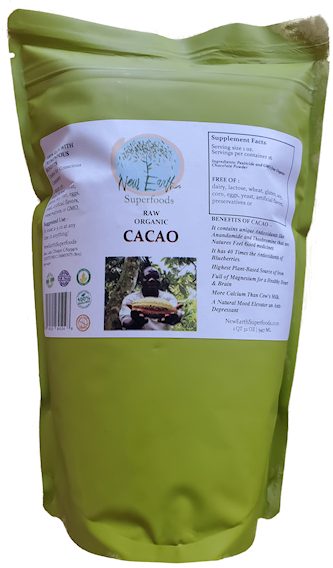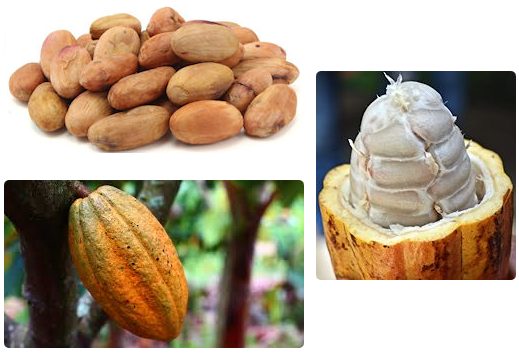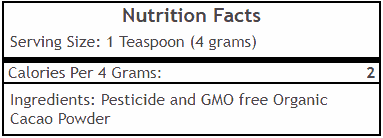- Improving lives since 2002
- Fast, Friendly Service
- Free Nutritional Counseling
The key to health is eliminating toxicities and deficiencies! - Dr. William R. Kellas



Our Organic Raw Cacao powder is lyophilized (freeze-dried), freshly picked, fermented, Organic powder of Cacao beans
Our Organic Cacao powder is low in heavy metals and rich in antioxidants and nutrients that help protect your cells from free radical assaults that cause aging and cellular deterioration.
It is very high in copper and other important minerals, vitamins, antioxidants, and phyotonutrients that work to improve health.
Cacao (pronounced “cu-COW”) refers to the Theobroma Cacao, pod-like fruits, each containing 20–60 beans surrounded by a sticky, sweet-tart white gel. Each tree produces about 30 pods a year. Our Organic Cacao powder is made from these beans or seeds (after the sticky pulp is removed).
Normal cacao powder and chocolate that people are familiar with are chemically processed and roasted, which destroys a large amount of the antioxidants and flavanols (the VERY things that keep a person young and healthy). A recent study suggested that between 60% and 90% of the original antioxidants in cacao are lost through "common" cacao processing. Such processing was originally developed in the early 19th Century to reduce the bitterness, darken the color, and create a more mellow flavor to chocolate, but unfortunately, this processing also eliminates most of its goodness.
Most non-organic cocoa/chocolate is treated heavily with toxic pesticides and fumigation chemicals and may contain genetically modified (GMO) products. Our Organic Cacao undergoes no such pesticide treatment!
Watch the videos below to learn more about Cacao, including how to open Cacao pods and make Chocolate. Note that our powdering method uses far less heat (never more than 108 degrees Fahrenheit) as we are far more interested in optimum nutrition than the authors of those videos, who are more interested in a delicious result.
We suggest you add Cacao Powder to Ricotriene, E7, Coconut Powder, Beet Juice Powder, or GPS powder. It makes these food powders delicious and more nutritious.
 Rishi Ternes, owner of New Earth Super Foods, left the study of medicine in Germany, came to the U.S. and turned his life over to the pursuit of nutrient dense food and seeking to understand the ability of food to transform health. He believes that “we are what we eat” and that “food should be our medicine”. Rishi owns a Super Food Cafe and Health Transformation Center in Arroyo Grande, California. He continues to search the world for foods that enable to the body to repair itself. As Rishi says, “the nutrients that your body needs are in the foods you aren’t eating.”
Rishi Ternes, owner of New Earth Super Foods, left the study of medicine in Germany, came to the U.S. and turned his life over to the pursuit of nutrient dense food and seeking to understand the ability of food to transform health. He believes that “we are what we eat” and that “food should be our medicine”. Rishi owns a Super Food Cafe and Health Transformation Center in Arroyo Grande, California. He continues to search the world for foods that enable to the body to repair itself. As Rishi says, “the nutrients that your body needs are in the foods you aren’t eating.”Food is the way of health not vitamins!
Cacao fits with the “first rule of health” which is that food should be our medicine. Cacao also fits with our second rule of health, which is that food engenders health, not vitamins. The United States has among the worst health statistics of all industrialized nations, yet the people of the United States consume more vitamins that the rest of the world combined. That means that you will eventually find, as so many others have already found, that your health will never really start to improve until you give up on vitamins and turn to food. It's time to turn to food!
Comparative Retail Price: $20 per half-pound.
Our Price: $18 per Pound
Raw Organic Cacao Powder


Take one to six teaspoons at a time. May be consumed several times per day.
We disclaim any claims (if there are any) made in these videos. They are for information, education, enlightenment and entertainment only.
Phytic acid (Phytates) is a unique natural substance found especially in plant seeds and nuts. Both in the stomach and bloodstream, Phytic acid (phytates) prevents the absorption of iron, zinc, and calcium, and other minerals, and thus may promote mineral deficiencies. It is often referred to as an anti-nutrient. It has been theorized that the presence of Phytic Acid in plant seeds is to discourage animials from eating seeds so that the seeds can go through a life cycle of germinating and creating a new life.
Sprouting and fermenting destroy the phytic acid and thus will allow a person to get the benefit of all the nutrients in the seeds or nuts.
Our organic cacao is sourced from several countries including Madagascar, Dominican Republic, Papua New Guinea and Peru. Every batch is tested and confirmed to have low levels of any naturally occuring heavy metals such as lead and cadmium. We partner with farms that consitently have the lowest levels.
Our partner's farm soils also have high sources of minerals such as copper, manganese, and selenium
Copyright 2002 - 2024. All rights reserved.
These statements have not been evaluated by the Food and Drug Administration. No product mentioned herein is intended to diagnose, treat, cure or prevent any disease. If you are pregnant, nursing, taking medication, or have a medical condition, consult your physician before making any lifestyle change, including trying a new product or food.
The information on this website is intended as a sharing of knowledge and information from the research and experience of the Healthy-Living.Org staff and contributors. It is not intended to replace a one-on-one relationship with a qualified health care professional and it is not intended as medical advice. You should not use the information on this site for diagnosis or treatment of any health problem or for modification of any medication regimen. You should consult with a healthcare professional before starting any diet, exercise or supplementation program, before starting or discontinuing any medication, or if you suspect you have a health problem. You should keep in mind that cited references to ongoing nutritional scientific study are most likely not accepted by the FDA as conclusive. These references and mentions of benefits experienced by others are disavowed as product claims and are only included for educational value and as starting points for your own research. No food or supplement can be considered safe for all individuals. What may benefit 999,999 of a million people may harm you. Therefore, no one can take responsibility for your health except you in concert with your trusted health professional.